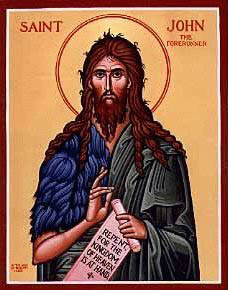
Paradigm in an Age of Apostasy: St. John the Baptist
By Patricius Anthony
TRADITIO Traditional Roman Catholic Internet Site
E-mail: traditio@traditio.com, Web: http://www.traditio.com
Copyright 2003 P. Anthony. Reproduction prohibited without authorization.

Few Saints' lives are more inspirational than that of St. John the Baptist. Since Christian antiquity, the Church has not only recognized his essential role as precursor in the plan of Redemption, but has rightly devoted a separate feast day in honor of his glorious martyrdom (August 29). The second designation stems, no doubt, from both the greatest compliment ever bestowed upon a mortal:
Amen I say to you, there hath not risen among them that are born of women a great than John the Baptist" [Matthew 11:11/DRV]
and the pious tradition which holds that the Divine Savior personally attended and, most likely, conducted the funeral ceremonies for His beloved kinsman.
While St. John's primary mission was to proclaim that the Kingdom of God had mercifully arrived, it is often overlooked that he sternly castigated the ecclesiastical authorities of the time who, by all accounts, had unjustly corrupted the Law for their own aggrandizement. The Baptist forthrightly addressed the matter in a tone which his Divine Master would often employ throughout His public ministry:
And seeing many of the Pharisees, and Sadducees coming to his baptism, he said to them: Ye brood of vipers, who hath shewed you to flee from the wrath to come? Bring forth therefore fruit worthy of penance. And think not to say within yourselves: We have Abraham for our Father. For I tell you that God is able of these stones to raise up children to Abraham. For now the axe is laid to the root of the trees. Every tree therefore that doth not yield good fruit, shall be cut down and cast into the fire. (Matthew 3:7-11/DRV)
It was not so much Roman rule that threatened the faith of the Old Testament people, but the mendacious actions of its hierarchy. The behavior of the Pharisees, Sadducees, and the other rabbinical sects of ancient times and the Novus Ordo establishment are strikingly similar. In a tragic sense, however, the Novus Ordo apparatus must bear a heavier responsibility for its apostasy because it was entrusted to uphold and defend the Deposit of Faith established by the Passion and Death of God's Son and the irrefutable fact of His Resurrection, while the Israelites, although highly privileged, possessed only the Divine word.
Since their hi-jacking of God's Holy Church, the Modernists have not only downplayed or ignored such courageous characteristics of Christ's most devoted followers, but in St. John's case they have brazenly denigrated his memory by engaging in oecumenical gestures with the infidel Muslims co-honoring the Baptist as a divinely-inspired prophet. Such a scandal, conducted by the highest Vatican officials, defames the great saint, is an affront to the faithful who seek his intercession, and, more egregiously, offends God.
St. John the Baptist lost his life because of his fervent and seemingly supernatural devotion to the Lord of the Universe not as a precursor for a virulently anti-Christian sect founded by a deranged and maniacal "prophet." Any Christian hierarch who tries to link the forerunner of the Divine Savior with the religion of Islam is not only defective spiritually, but should be condemned and ostracized by the faithful.
While most Catholics will not have to suffer the same grizzly fate as St. John the Baptist, they, nevertheless, are duty-bound to defend, with their lives if necessary, Christ's Church from either external enemies or those which reside in its bosom. The most significant reason why the Church has sunk to its present nadir is that too many of its members have been absorbed with worldly matters.
Although family, financial success, love of neighbor and patriotism are important priorities, a Catholic's allegiance is first to Almighty God and His Church. If just a few more souls had opposed the sinister changes when they were unleashed upon the Church, the faithful and the world at large would have been spared a considerable amount of misery. Tragically, temporal allurements, the blind trust that so many put in their fellow man rather than God, and the growing Indifferentism to religion in general, provided the opportunity for the liturgical barbarians to disseminate their wicked errors.
Catholics of the post-Conciliar era are now suffering through the same dire consequences that many of their "separated brethren" have lived through for the past half millennium after the latter foolishly turned away from God's Holy Church and pridefully conducted their "Reformation." With the Church's abandonment of Tradition and thus the Sacramental means by which its Founder mercifully provided for eternal life and social harmony, Catholics are left exposed to the malignant forces of the Prince of this world. It is not "victory" in the cultural war that will turn around a degenerate Western world, as many conservatives contend, but the restoration of true Catholicism and mankind's re-embracement of it.
If Catholics want to reverse the Counterfeit Church's march into perdition, the best course of action would be to emulate the example of St. John the Baptist, who refused to remain silent when God's Church was wantonly led astray, but exposed and condemned evil despite the consequences. It would not be hard to imagine that a glorious future awaited those who displayed similar courage as the forerunner of the Divine Savior once did.